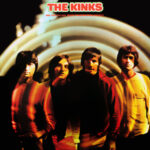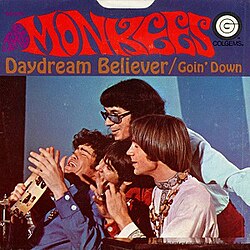 When The Kinks Are the Village Green Preservation Society hit shelves in November 1968, it landed in a world already brimming with revolution. The Beatles had released The White Album. The Rolling Stones were leaning into darkness with Beggars Banquet. The Who were about to invent the rock opera. Psychedelia, protest, and power were in the air. And yet, while everyone else was reaching for the stars, Ray Davies and The Kinks turned inward — into the heart of England itself.
When The Kinks Are the Village Green Preservation Society hit shelves in November 1968, it landed in a world already brimming with revolution. The Beatles had released The White Album. The Rolling Stones were leaning into darkness with Beggars Banquet. The Who were about to invent the rock opera. Psychedelia, protest, and power were in the air. And yet, while everyone else was reaching for the stars, Ray Davies and The Kinks turned inward — into the heart of England itself.
At its core sat the song that defined the whole project: “The Village Green Preservation Society.” A jaunty, bittersweet anthem for everything quaint, quirky, and quintessentially British — from little shops and china cups to draft beer and strawberry jam. It wasn’t just nostalgia; it was an act of cultural preservation, a melodic love letter to a disappearing way of life.
More than fifty years later, “Village Green Preservation Society” stands as one of the most beautifully peculiar songs in rock history — a piece that sounds like it’s smiling through a tear. It’s wistful, witty, and utterly timeless.
A Different Kind of Rebellion
In 1968, rebellion was the fashion. The Beatles sang of revolution, Jimi Hendrix burned guitars, and counterculture was at its psychedelic peak. The Kinks, however, were never joiners. By that point, they were already outsiders in the British Invasion crowd — partly by choice, partly by circumstance.
Their early career had been turbulent: banned from touring America for years due to behavioral and visa issues, the group’s momentum had faltered just as The Beatles and Stones were conquering the world. While others turned global, Ray Davies turned local. He became fascinated not with the future but with the past — the fading Englishness of postwar life, the vanishing villages, the ordinary eccentricities of everyday people.
“The Village Green Preservation Society” is rebellion through reflection. It pushes back not against governments or wars, but against the modernization of the soul. Davies wasn’t protesting politics; he was mourning the loss of gentleness, of tradition, of small joys that globalization and progress were threatening to bulldoze.
It’s rebellion in a teacup — polite but profound.
“We Are the Village Green Preservation Society…”
The song opens with a strum that feels instantly familiar — like opening a front gate to a village you somehow already know. Then comes that chorus, sung with both humor and sincerity:
“We are the Village Green Preservation Society,
God save Donald Duck, vaudeville and variety…”
It’s funny and oddly moving all at once. The juxtaposition of sacred and silly — placing a cartoon character next to a plea for cultural survival — captures the entire essence of The Kinks. Davies wasn’t mocking tradition; he was celebrating it in the only way he knew how: with irony and affection.
The song continues like a roll call of endangered treasures:
“Preserving the old ways from being abused,
Protecting the new ways for me and for you…”
It’s part hymn, part pub singalong, and part manifesto. Yet underneath its whimsy lies melancholy. Ray Davies, just 24 at the time, already sounded like an old soul watching his world dissolve.
The production, handled by Davies himself, gives the song a cozy warmth. The acoustic guitars, honky-tonk piano, and subtle brass swell make it sound like it could have been recorded in a village hall rather than a London studio. There’s no psychedelic echo or electric fire here — just the glow of nostalgia.
Ray Davies: The Gentle Chronicler of England
Ray Davies has often been called rock’s great storyteller, and “The Village Green Preservation Society” is perhaps his most complete story in miniature.
While Bob Dylan chronicled America’s chaos and Lennon screamed for revolution, Davies chronicled Britain’s disappearing normalcy. He wrote not about fame or fantasy but about the quiet poetry of real life — the shopkeepers, daydreamers, and eccentrics who gave postwar England its charm.
In “Village Green Preservation Society,” that theme becomes a mission. Davies is both the narrator and the preservationist. You can hear his affection for the things he’s listing — “draught beer and virginity,” “custard pies and morality.” It’s all sung with a wink, but never cruelty.
The song plays like a musical photograph album. Every line feels like another snapshot of a world about to fade — a Britain that still had milkmen and penny sweets, cricket on Sundays and gossip by the post office.
What’s remarkable is how Davies manages to make nostalgia feel radical. In a decade obsessed with breaking the old order, he wrote an anthem to save it.
A Small Song About Big Things
It would be easy to dismiss “Village Green Preservation Society” as a novelty, but that would miss the genius of The Kinks. Beneath the surface-level charm lies a profound statement about identity, belonging, and time.
In 1968, England was changing rapidly — suburban sprawl, television, consumer culture, and a new youth identity were rewriting what it meant to be British. The Kinks’ song was a defense mechanism against that tidal wave.
When Davies sings about “preserving the old ways,” he’s not just being cute — he’s acknowledging the anxiety of a country losing its personality. It’s the same sentiment that would later run through punk’s anger and Britpop’s pride. Blur’s Parklife, The Jam’s English Rose, and even Arctic Monkeys’ early snapshots of working-class life all descend from the same lineage: the romantic urge to document before it disappears.
The song’s beauty is that it knows it can’t actually stop change — and that’s what gives it its ache. It’s a love song to impermanence.
The Album It Anchored
The Kinks Are the Village Green Preservation Society wasn’t an immediate success. In fact, it barely sold at all upon release. Overshadowed by flashier contemporaries, it didn’t even crack the charts. But over the years, it became recognized as one of the most quietly revolutionary albums of its time.
The record is full of songs about smallness — “Do You Remember Walter?,” “Picture Book,” “Last of the Steam-Powered Trains” — all meditations on aging, nostalgia, and belonging. But the title track is the glue that holds it all together. It’s both mission statement and mood setter.
Ray Davies once said he wanted the album to feel like “a collection of stories about a village and its people.” That’s exactly what it is — and “The Village Green Preservation Society” is the welcome sign at its entrance.
Over time, critics and musicians alike would come to see it as one of the great achievements of British pop — a work that helped define the idea of Englishness in modern music.
Humor as Armor
Part of what makes “Village Green Preservation Society” endure is its tone. Davies never sermonizes. His humor is his armor.
Take the line:
“God save little shops, china cups, and virginity.”
It’s both absurd and perfect. He’s skewering prudish Britishness even as he celebrates it. That duality — loving and laughing at the same thing — is Davies’ gift. The Kinks could write songs that made you laugh one moment and sigh the next.
That same balancing act can be seen across their career — from “A Well-Respected Man” to “Sunny Afternoon.” Ray Davies never judged his characters; he humanized them, warts and all. And in “Village Green Preservation Society,” the character is England itself — flawed, funny, fading, but still worth saving.
A Song That Outlived Its Time
Ironically, “Village Green Preservation Society” has aged better than most 1960s anthems about progress. Its themes — cultural identity, nostalgia, the fear of losing one’s roots — have only become more relevant.
In an age of globalization, homogenization, and digital everything, the song feels prophetic. Substitute “Starbucks” for “draught beer” and “streaming services” for “variety,” and it still works. It’s about holding onto something real in a world that moves too fast to remember what it once was.
Bands like Blur, Pulp, and The Smiths all owe something to The Kinks’ version of observational songwriting. Damon Albarn, in particular, has cited Village Green Preservation Society as a direct influence on Parklife, with its similar mix of satire, affection, and social portraiture.
But even outside of music, the song resonates. It’s been adopted as a kind of unofficial anthem for those who love the eccentricities of local culture — from preservation societies to British heritage movements. Davies might have been joking when he wrote it, but he accidentally became their patron saint.
The Enduring Warmth
There’s something deeply comforting about the way “Village Green Preservation Society” sounds. The harmonies are cozy, the arrangement feels handmade, and Ray’s delivery — gentle but full of character — gives it a lived-in charm.
Unlike so many songs of its era, it doesn’t scream for attention. It just exists, like a warm pub on a cold day. You come back to it not because it changes your life, but because it reminds you that the simple things matter.
And that’s its true power. Beneath the humor and nostalgia lies an emotional truth that transcends its English setting. Every listener, no matter where they’re from, understands the fear of watching their world disappear — the streets, faces, and traditions that once made home feel like home.
“The Village Green Preservation Society” isn’t just a song about England; it’s a song about memory, belonging, and the universal need to hold onto something that feels like us.
The Final Verse
When The Kinks recorded “The Village Green Preservation Society,” they couldn’t have known they were creating one of the most enduring songs in British pop. They were simply writing about what they loved — and what they feared losing.
In the decades since, the world has only sped up. The small things Ray Davies wanted to protect have mostly vanished, but the song itself has become the very thing it celebrated: a preserved artifact of a gentler time.
It’s fitting that this tune about preservation became a piece of history worth preserving.
“The Village Green Preservation Society” is more than nostalgia — it’s empathy set to melody. It’s Ray Davies raising a pint to the ordinary, the outdated, and the overlooked, reminding us that in a world obsessed with progress, there’s something quietly heroic about remembering where we came from.


